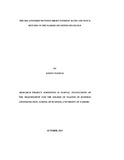| dc.description.abstract | Among the most notable developments have been the establishment and revitalization
of stock markets in emerging economies; and the shift from fixed exchange rates
towards independently floating exchange rates. Though some stock markets in
emerging economies have been performing exceptionally well (IFC, 1993), most of
them tend to be very small in size, with very low volume of transactions. Stock
market return has been a concern in the financial sector around the world. Stock
markets in emerging market especially in African has gained prominence since the
market has developed a step further to risk diversification apart from the primary role
of providing an alternative source of capital for investment. This has been attributed
by short interests which largely contribute to the stock market returns (Adam, &
Tweneboah, 2008). To establish the relationship between short interest rates and stock
returns in Nairobi Securities Exchange.
The research design to be used in this study was both cross sectional and descriptive
survey method. The target population consisted of all the stocks listed at NSE as at
December 2012 from which NSE share index was derived from. This was a census
study where all firms listed at Nairobi Securities Exchange from 2008 to 2012 were
included. The data set consists of monthly observations of the closing price index and
interest rates in the stock markets. Time series secondary data was used in the study.
Monthly data on the Nairobi Securities Exchange Index was obtained from the
Nairobi Securities Exchange. The data analysis entailed entering the data in SPSS
(21.0). Linear relationship between the dependent and the independent variables was
determined through panel approach for the regression analysis and inferences were
drawn based on the regression analysis.
The study found out that, interest rates positively influenced the stock returns at the
NSE. The stock market’s reaction to real economic variables. Stock returns were
found to be positively related with interest rate. The link between movements in
interest rates and industry equity returns is weak at the shortest scales, but it becomes
stronger at longer horizons corresponding to low frequencies.
The study recommends the stock authority to focus on increasing the interest rates of
the NSE. The evidence presented in this study may be very helpful for the assessment
of potential sector-based diversification opportunities by investors, for the design and
implementation of adequate interest rate risk management strategies by firm managers
and investors, for asset allocation decisions by portfolio managers and for the
formulation of appropriate monetary policy measures by governments. | en |

